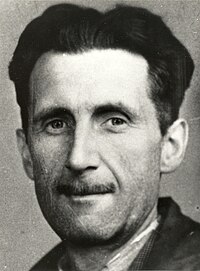George Orwell bibliography
 Orwell pictured by the National Union of Journalists in 1933 |
||
| Releases | ||
|---|---|---|
| ↙Books | 3 | |
| ↙Novels | 6 | |
| ↙Articles | 556 | |
| ↙Stories | 5 | |
| ↙Collections | 37 | |
| ↙Pamphlets | 7 | |
| ↙Poems | 18 | |
| ↙Plays | 1 | |
| ↙Scripts | 4 | |
| ↙Journals | 5 | |
| ↙Letters | 5 | |
| ↙Books edited | 2 | |
| ↙Periodicals edited | 1 | |
| ↙Newspapers edited | 2 | |
| ↙Complete works | 647 | |
| References and footnotes | ||
|
|
The bibliography of George Orwell includes journalism, essays, novels and non-fiction books written by the British writer Eric Blair (1903–50), either under his own name or, more usually, under his pen name George Orwell. Orwell was a prolific writer on topics related to contemporary English society and literary criticism, whom the British newsweekly The Economist in 2008 declared "perhaps the 20th century's best chronicler of English culture." His non-fiction cultural and political criticism constitutes the majority of his work, but Orwell also wrote in several genres of fictional literature.
Orwell is best remembered for his political commentary as a left-wing anti-totalitarian. As he explained in the essay "Why I Write" (1946), "Every line of serious work that I have written since 1936 has been written, directly or indirectly, against totalitarianism and for democratic socialism, as I understand it." To that end Orwell used his fiction as well as his journalism to defend his political convictions. He first achieved widespread acclaim with his fictional novella Animal Farm and cemented his place in history with the publication of Nineteen Eighty-Four shortly before his death. While fiction accounts for a small fraction of his total output, these two novels are his best-selling works, having sold almost fifty million copies in sixty-two languages by 2007—more than any other pair of books by a twentieth-century author.
Orwell wrote non-fiction—including book reviews, editorials, and investigative journalism—for a variety of British periodicals. In his lifetime he published hundreds of articles including several regular columns in British newsweeklies related to literary and cultural criticism as well as his explicitly political writing. In addition he wrote book-length investigations of poverty in Britain in the form of Down and Out in Paris and London and The Road to Wigan Pier and one of the first retrospectives on the Spanish Civil War in Homage to Catalonia. Between 1941 and 1946 he also wrote fifteen "London Letters" for the American political and literary quarterly Partisan Review, the first of which appeared in the issue dated March–April 1941.
...
Wikipedia
